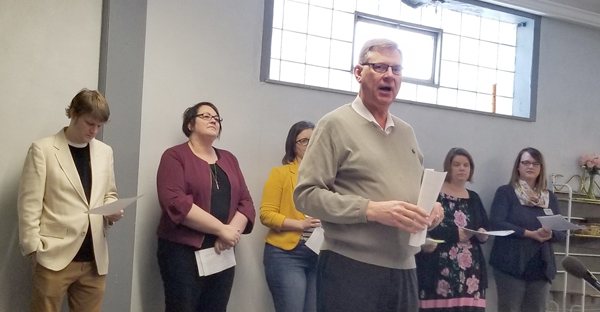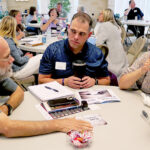
Deacon Steve Barton, president of Quad Cities Housing Cluster, speaks during a press conference Nov. 30 at King’s Harvest Ministries in Davenport. Community organizations came together to ensure that the Quad Cities Winter Emergency Shelter could open as scheduled on Dec. 1.
By Lindsay Steele
The Catholic Messenger
DAVENPORT — Last year, about 400 individuals found overnight refuge from the cold at the Quad Cities’ only overflow shelter, Quad Cities Winter Emergency Shelter at King’s Harvest Ministries. When faced with the scenario that this life-saving shelter might not be able to open on Dec. 1 as scheduled, community organizations concerned with homelessness stepped up to help.
Christie Adamson, chief operating officer of Humility Homes and Services (HHS), said Terri Glieze, director of King’s Harvest, reached out in early November to express concerns about the emergency shelter’s viability for the 2018-19 winter season. Finding enough overnight volunteers has been a longtime struggle for Glieze, who has often put in more than 12 hours a day to make the program possible.
HHS and other organizations that operate a homeless shelter are almost always at full capacity, especially in the winter, so the overflow shelter fulfills a critical need for people who have nowhere else to go.
Once aware of the situation, HHS and other community organizations reacted quickly to ensure that the shelter could open as scheduled. This meant raising money to hire paid staff. United Way of the Quad Cities committed $30,000 and challenged other organizations and individuals to make financial contributions for a more sustainable emergency shelter. “We know this is a community issue and that it needs to be addressed as a community with everybody’s efforts,” said Karrie Abbot, chief operating officer of United Way of the Quad Cities.
Major donations soon came in. Build to Suit/RE Focus Development, Downtown Davenport Partnership and QC Community Foundation each donated $10,000, and Scott County Community Services and Scott County Housing Council each donated $5,000.
HHS will manage the shelter this winter. Adamson noted that the area shelters decided HHS was best equipped to hire and train staff. With the donated money, four individuals have been hired to work at the winter emergency shelter. Additional HHS staff members will fill in as needed. “Terri (Glieze) had a system in place. We just adopted the procedures and put staff in place. Participants won’t notice a difference.” The shelter is open nightly through April 15 from 9 p.m. to 7 a.m.
Kyle Carter, executive director of Downtown Davenport Partnership, said of the organization’s financial contribution, “(we) made a very swift decision to assist with this. Not only do we believe in the principle of making sure the winter shelter stays open here but we believe very strongly in the Humility of Mary, particularly in addressing the systemic issue of why people are experiencing homelessness in the first place.”
The Quad Cities Housing Cluster and Scott County Housing Council are coordinating efforts to ensure the Winter Emergency Shelter plan is fully integrated into the Quad Cities’ overall strategy to make homelessness rare and brief, according to a press release from Scott County Housing Council. Components of this year’s plan include making sure all shelter guests are entered into the Homeless Management Information System for tracking and counting purposes. A newly established Quad Cities Coordinated Entry System will ensure that persons experiencing a housing crisis are quickly identified and have fair and equal access to housing and assistance based on their strengths and needs. Guests will be able to access limited service coordination and supportive services during the daytime.
Leslie Kilgannon, director of Scott County Housing Council, said it is encouraging and heartening that so many organizations and individuals responded so quickly to keep the winter shelter open. However, the root causes of homelessness remain and must be addressed in the long-term, primarily the lack of affordable housing units in the Quad Cities. “The community needs to take a look at long- term solutions. … We can be ambitious. It doesn’t have to be this way.”
Adamson said the Quad City Housing Cluster, of which HHS is a member, “will be leading the way to not just come up with a more permanent solution (to homelessness) but a path forward where, someday, we won’t need a winter shelter in our community.”











